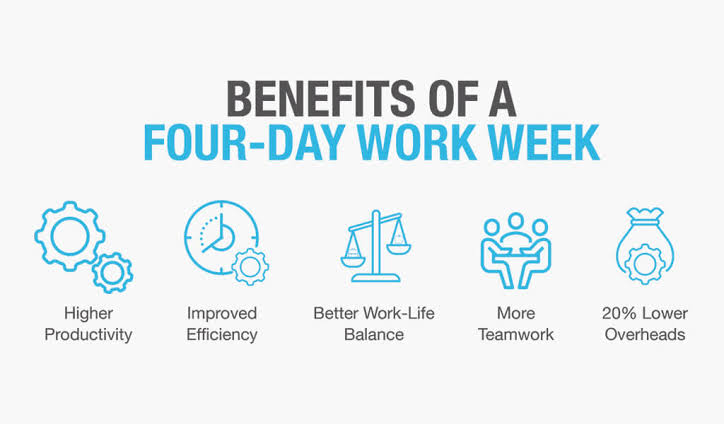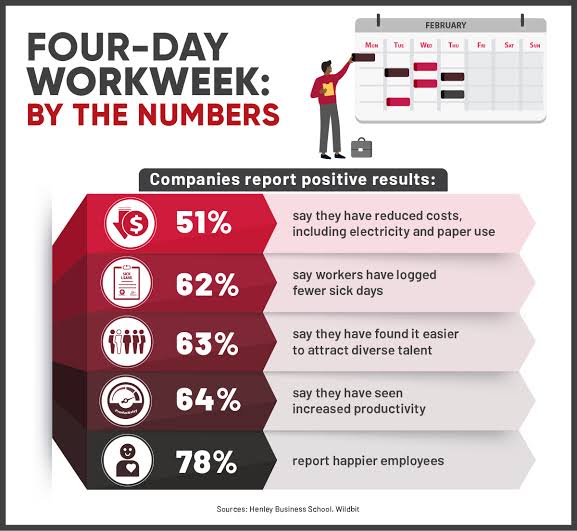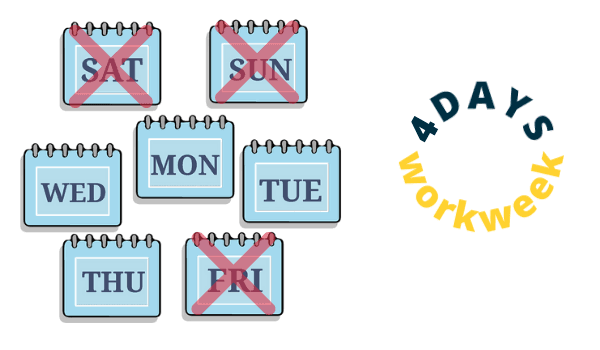A four-day work week is an innovative concept where employees work for four days instead of the traditional five, while still earning the same pay. This idea has been gaining significant attention as a potential way to improve work-life balance, increase job satisfaction, and boost productivity. Advocates argue that a shorter work week can lead to numerous benefits for both employees and employers.
One of the primary advantages of a four-day work week is the improvement in work-life balance. With an extra day off each week, employees have more time to spend with family and friends, pursue hobbies, or simply rest and recharge. This additional personal time can help reduce stress and burnout, leading to a healthier and happier workforce. Moreover, a better work-life balance can enhance employees’ mental and physical well-being, potentially reducing absenteeism and healthcare costs for employers.
Increased job satisfaction is another significant benefit associated with a four-day work week. Employees who feel they have more control over their schedules and personal lives are generally more satisfied with their jobs. This satisfaction can translate into higher morale, increased loyalty, and reduced turnover rates. When employees are happier and more content, they are more likely to stay with their current employer, reducing the costs and disruptions associated with frequent employee turnover.
Benifits of A Four-Day Work Week

- Improved work-life balance: With an extra Day of employees can spend more time with families, pursue hobbies, or simply rest. This can lead to happier and healthier workforce.
- Increased Productivity: Some studies suggest that employees can be more productive when they work fewer days. With better rest and more focus, they May accomplish the same amount of work or even more
- Employee Retention and Attraction: Offering a four day work week can make a company more attractive to potential hires and help retain current employees who appreciate the better work life balance.
- Reduce Stress and Burnout: More time can help reduce chest levels, and prevent burnout, Leading to more engaged and motivated workforce.
Challenges of a Four-Day Work Week
- Maintaining Productivity: Employers and employees must find ways to maintain or increase productivity within the shorter work week. This could involve longer work hours each day, better time management, or more efficient work processes.
- Business Continuity: Some businesses, especially those that operate customer-facing or service-based roles, need to ensure they can still meet customer needs without interruption. This might require staggered work schedules or other adjustments.
- Overcoming Resistance to Change: Both management and staff may be resistant to changing long-established work patterns. Successful implementation requires a shift in mindset and a willingness to adapt.
- Legal and Logistical Issues: Depending on the country and industry, there may be legal and logistical hurdles to overcome, such as compliance with labor laws and adjusting payroll systems.
Strategies for Success
- Clear Communication and Planning:both employers and employees need to communicate clearly about expectations, goals and responsibilities. Detailed plan is essential to ensure a smooth transition.
- Pilot Programs: Implementing a pilot program allows businesses to test the four-day work week on a small scale, gather feedback and make necessary adjustments before a full rollout.
- Focus on Outcomes: Shifting the focus from hours worked to results achieved can help ensure that productivity remains high. Setting clear performance metrics and goals is key.
- Flexible Work Arrangements: Flexibility is crucial. Some businesses might find it more practical to allow different departments or teams to adopt the four-day work week at different times.

Conclusion
A four-day work week has the potential to offer significant benefits for both employees and employers, including better work-life balance, increased productivity, and higher employee satisfaction. However, making this transition requires careful planning, clear communication, and a willingness to adapt to new ways of working. If these challenges can be managed effectively, a four-day work week could become a viable and beneficial option for many organizations.


Thanks for providing such a balanced and informative perspective on this evolving topic
This post provides a balanced and insightful exploration of the potential benefits and challenges associated with a four-day workweek. It effectively highlights how such a shift can enhance productivity, work-life balance, and environmental sustainability while acknowledging concerns like workload compression and industry-specific constraints. The suggestions for gradual implementation, flexible scheduling, and ongoing evaluation offer practical strategies for organizations considering this innovative approach. A well-rounded perspective on a contemporary topic shaping the future of work.
The 4-day workweek is a great concept. I love the way the writer mentions all the pros, cons and else.
It envisages relief from job stress and help in pursuing your own things that’s the best part. nowadays, people are so into job work they even forget to do selflove .